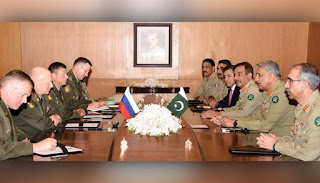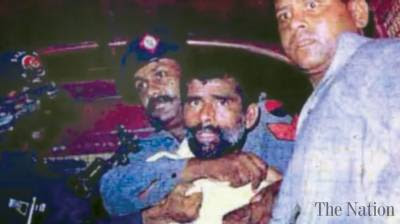Hybrid war in Balochistan hampers Russian forays in Middle East
Hybrid war in Balochistan hampers Russian forays in Middle East
Jan Achakzai
As part of its grand strategic goal to integrate with markets in the Middle East and project influence, Russia is looking forward to benefit Pakistan's new maritime capability, re, Gawadar Port, But it has serious concerns over the on going hybrid warefare including disinformation Ops deployed on behest of India– which has sought to focus on Bochistan.
Signaling India, tthe successor state of the former USSR, Russia has underlined its increasing sensitivity attached to the stability of Pakistan.
Against the backdrop of traditional alliance between Russia and India, two major trends agitating against the very underpinnings of this bond: first since India is going indeginous in terms of defence requirements, in the next decade, Moscow is well aware of the potential decline in Indian imports of its military hardware hence the downward trajectory; second, India is new role agiinst China in the Quad's security platform has emerged as major divergence between the two countries.
Here comes Russia's new embrace of Pakistan to balance. The rising clout of Islamabad vs the decling trajectory in bilateral relations make Russia a direct stake holder in the stability of Pakistan.
In other words, Russia-Pakistan relations have acquired a robust momentum: the ceiling set by the strategic relations of Russia-India has almost come off and the nature of increasingly transactional relations of Pakistan-US ties expanded the scope of the new alignment between the two countries.
This gradual improvement in ties between Moscow and Islamabad is not happening without evolving geo-politics of the region.
As diplomatically things have gone worse for India after its annexation of IOKashmir, Russia for the first time sought to carve out a new geo-political role in South Asia to potentially use its good offices and leverage to diffuse a dangerous standoff between India and Pakistan in the wake of modified status of Indian Occupied Kashmir by Delhi. On the brink, South Asia is bracing for a potential escalation as the situation may turn worse any moment, once India eases restrictions and lift curfew in the IOK. The new role is part of Russia’s pivot to Asia: it being already involved in West Asia—Afghanistan, Syria, Iran crisis, Middle East—its growing ties with Saudi Arabia and the UAE. Now Russia tends to enter into South Asia with the IOK offering the best of opportunity to assert its geo-political prowess and conflict resolution expertise.
The contours of the new quest were on full display during the ldiplomatic showdown between Pakistan and India in the UNSC. Unlike the Ex-USSR which used multiple vetoes in India’s favour in such crisis, Moscow did not oppose China to take up the issue in UNSC; it even encouraged to debate it openly and on record. It was not a mere coincidence that Russia signalled distancing itself from its past’s narrative on Kashmir and linked UN resolutions and Charter with bilateral agreements as modus operandi for resolution of Kashmir, to the dismay of the Indian Establishment and shock to Russian watchers. Paradoxically, It came on the heels of Russia’s annexation of Crimea militating against any prospect of U.N. involvement in such a geo-political dispute as Russia feels UN body is nothing but an extension of the US foreign policy tool.
Moscow’s earlier statement, re, provision 370 scrapping, being “India’s internal matter” was merely a balancing act viewed against its newfound position in UNSC: fully backing China for raising the issue, openly debating it and also endorsing UN resolutions, indirectly nullifying its position. In other way, the balancing act (statement justifying 370 scraping by Russian FM) is part of Russia’s quest not to angry Delhi to the extent of losing its hardware market.
Moscow also offered many options including a high level conference to invite all the concerned parties in order to de-escalate, seek ideas how best it can help resolve the issue. It may not be a classic mediation but definitely Russia has leverage with India and now Pakistan to expand its new found role in South Asia—defusing a nuclear flashpoint which has clearly threatened to undercut its wider geo-political interests in the region.
Before arriving at this point, Russia has found itself into a larger scheme of things panning out over a period of time:
Moscow is unhappy with India’s strategic partnership with the US and with it endorsing and strengthening, by Delhi, the so-called rule base unipolar political, economic and strategic world, spearheaded by US; Moscow has also dismayed over India’s refusal to join duo (China and Russia) to work out a multipolarity and an alternative to the US led order; lastly, it wants core interests of Pakistan protected which happen to converge with Russia as Islamabad interestingly comes in as a handy leverage for Russia in multiple ways. And here is how?
Pakistan and Russia have found common ground on many strategic, and geo-political issues while expanding relations from military to economic to cultural aspects of bilateral ties:
The latest manifestation of burgeoning ties between the two countries is the current standoff between India and Pakistan in the aftermath of scrapping of 370 Article. Russia is (as mentioned above) is manoeuvring to play a potential role behind the scene; b) on Balakot incident, Russian President Putin put pressure on Delhi to de-escalate, offered mediation and refused to acknowledge India’s right to reply, i.e, attack Pakistan, after Palwama unlike the US which backed India. Moscow was very much conspicuous in reducing tension between Islamabad and Delhi—this was an episode which underlined thaw in the relations of the two countries.
Starting from defence and strategic relations, Pakistani and Russian Military-to-military interactions have increased manifold. Though traditionally Moscow has stronger defence ties with India and supplied weapons to Delhi, for the first, Islamabad has received offers of light and heavy weaponry to meet the need of Pakistan army. The recent visit of Russian Chief of Army Staff to Pakistan was hugely significant. Both countries reached an understanding of the scope and limits of defence relations: one breakthrough was an offer to boost Pakistan’s surface to air defence capability through a creative mechanism and in a manner that could not alarm Indian sensitivity given Delhi is a bigger arms market for Russia. Moscow also offered giving training on Naval warfare , naval technical and tactics; officers exchange programmes like war courses, staff courses etc.
Russia has shown keen interest in Balochistan and agreed to invest in the emerging energy, economic and logistical corridor with only one caveat—not to use the word “CPEC” so as not to piss India off. This convergence is of great significance. Gawadar provides the shortest route to Russia to warm water. It has only two routs to access Middle East and beyond, first is Iran and the second, is Gawadar—Balochistan. Since India has shunned BRI and CPEC, Russia has already embraced the BRI and now wants to integrate with the CPEC.
Recently, in another stand-off, Russia outrightly backed Pakistan when Islamabad’s relations deteriorated with Iran over a terrorist incident. It was Moscow which warned Iran and tiny Gulf state of Oman not to undermine the strategic environment in Pakistan’s soft belly—Balochistan. The message was conveyed at the highest level in Moscow to Iranian Ambassador saying “we were shocked on the spat between Iran and Pakistan over the incident”. Moscow was indirectly playing host and resolving issues between Iran and Pakistan. A Pakistan’s delegation led by Gen Ikram ul Haq attended Bisishak conference in April 2019, (ie, one security talking point and agenda item between Pakistan and Russia was Omara as the Iranian delegation was also invited to join in).
On Balochistan, Moscow was also keen to underline its concern with even India. After surge in terrorist activities in the province supported by Delhi from Afghanistan and Iran, Russia clearly told off Indians that Moscow supported Delhi on Pulwama incident and offered to rescue them through mediation but Russia’s stakes in Balochistan have gone up manifold due to CPEC. “We fought for warm waters under USSR now we are getting access for free through CPEC” why would one undermine CPEC?” was the gist of the stern message.
Unlike in the past, Russia and Pakistan have forged deeper understanding on Afghanistan. Moscow no longer views the Taliban as a threat to its security and stability and relying on Pakistan as stabiliser in Afghanistan and Central Asia. Pakistan fully backed Moscow’s Intra-Afghan Dialogue and urged the US to take Russia and China on board on Afghanistan. This is why unlike Syria, Afghanistan has witnessed a geo-political cooperation rather than competition between Moscow and the US, courtesy Pakistani efforts.
Apart from energy and economic cooperation , Moscow is also looking at other options of cooperation with Islamabad.
To summarise, the latest efforts of Russia on Kashmir are borne out of its short term concerns in the region: any possible conflagration between Pakistan and India over Kashmir will adversely harm vital interests of Russia in West and South Asia: Iran crisis—a leverage for Russia is about to get worse with events in Persian Gulf on a knife edge—the US’s impending withdrawal from Afghanistan, India’s hardware market for Moscow and Pakistan’s stabilising role in Afghanistan and region.
Pivoting to Asia, Russia’s raproshmant with Pakistan encompassing warm water access, abiding interests in West and South Asia, it’s quest to play a role on Kashmir is not far fetched.
After Pakistan winning diplomatic and perception war at the UNSC with an open backing from China, no opposition from Russia and a clear support from the UK, India should be very worried as to how it’s old brotherly country (Moscow) no longer provides unqualified support for its Kashmir policy and upward trajectory in relations with Pakistan is now firmly set in.
The balancing of India to buy Russian weapons can not be an abiding insurance policy against the increasing tilt of Moscow towards Pakistan, unless Delhi removes Russian anxiety over strategic US-Indian relations. Thus Balochistan has added to Islamabad's clout pitching itself as another area to push Russian fodays into Middle East.




Comments
Post a Comment